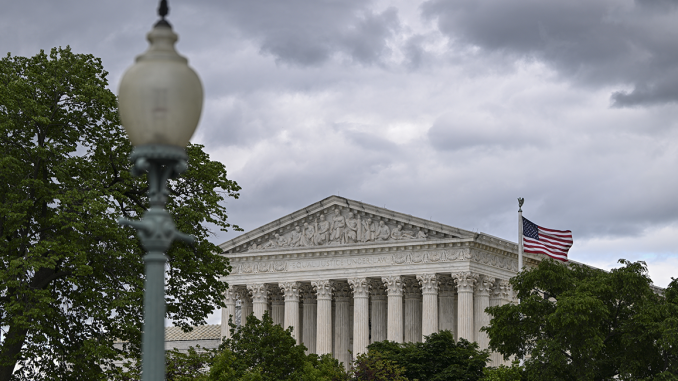
The Supreme Court struck down President Joe Biden’s student loan “forgiveness” plan Friday.
The nation’s highest court heard arguments in February in two cases: Biden v. Nebraska and Department of Education v. Brown.
Chief Justice John Roberts wrote the opinion in Biden v. Nebraska, 6-3, striking down Biden’s plan. The court unanimously denied standing in the Brown case.
Biden announced plans last August to cancel $10,000 of debt for individual student loan borrowers who make less than $125,000 per year ($250,000 for households) and to forgive $20,000 of debt for borrowers who received a Pell Grant.
Biden’s Education Department relied on a post-9/11 law known as the HEROES Act of 2003 that grants the U.S. secretary of education the authority to allow military troops to delay their student debt obligations during national emergencies. (HEROES is an acronym for the Health and Economic Recovery Omnibus Emergency Solutions.)
Roberts ruled that “the HEROES Act provides no authorization for the Secretary’s plan even when examined using the ordinary tools of statutory interpretation—let alone ‘clear congressional authorization’ for such a program.”
“In the [Biden v. Nebraska] case, several states argue that they have standing primarily because if Biden cancels student loan debts, state agencies that the federal government pays to service those loans will lose revenue because they are paid on a per-loan basis,” GianCarlo Canaparo and Jack Fitzhenry of The Heritage Foundation’s Meese Center for Legal and Judicial Studies wrote in a commentary for The Daily Signal, which is Heritage’s multimedia news organization, adding:
That loss of revenue, in turn, could diminish funds available for scholarships and other education programs meant to benefit citizens of those states. In response, U.S. Solicitor General Elizabeth Prelogar, representing the Biden administration, argued that those state entities are not really arms of the states that they serve, and thus, the states cannot sue on behalf of the agencies.
Canaparo and Fitzhenry also wrote:
In the [Department of Education v. Brown] case, two borrowers who did not qualify for debt cancellation argued that by creating this program in secret and pursuant to emergency powers, the administration denied them the procedural right to participate in the decision-making process.
In response, Prelogar argued that the law did not require the government to involve anyone in this process.
EJ Antoni, a research fellow for regional economics in Heritage’s Center for Data Analysis, weighed in on the implications of canceling student loan debt, especially the cost.
“The Biden administration’s estimated cost for student loan ‘forgiveness,’ which is actually transference, is laughably low. More reliable estimates, including dynamic estimates which account for incentive effects and behavioral changes, have a price tag north of $1 trillion,” Antoni told The Daily Signal in a written statement. “Not only is there an upfront cost to taxpayers of assuming current student loans, but there are future costs as well.”
“Debt transference incentivizes futures students to borrow more, in anticipation of future transference,” Antoni added. “Additionally, people who wouldn’t have borrowed at all will take out loans for the same reason. That will lead to tuition increases and higher costs of attendance, as has happened every time student loan programs were expanded and borrowing increased.”
This is a breaking story and may be updated.
The Daily Signal’s Virginia Allen and Fred Lucas contributed to this report.
Have an opinion about this article? To sound off, please email letters@DailySignal.com and we’ll consider publishing your edited remarks in our regular “We Hear You” feature. Remember to include the url or headline of the article plus your name and town and/or state.

Be the first to comment